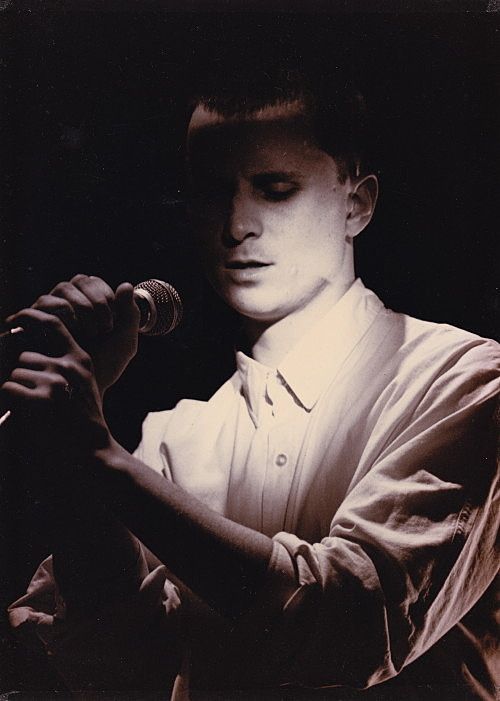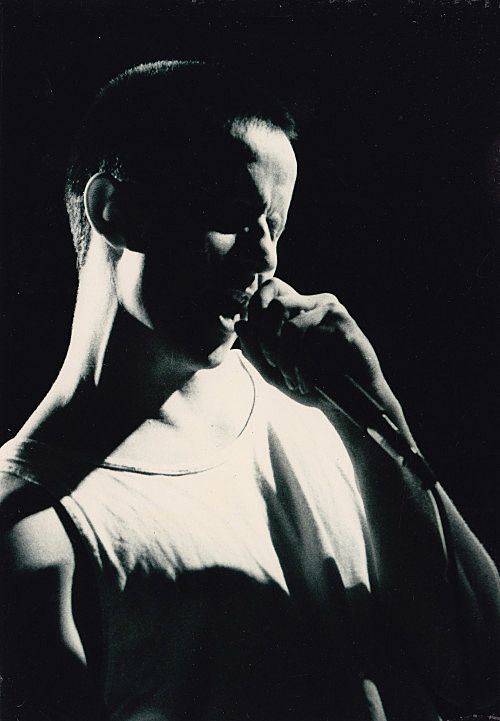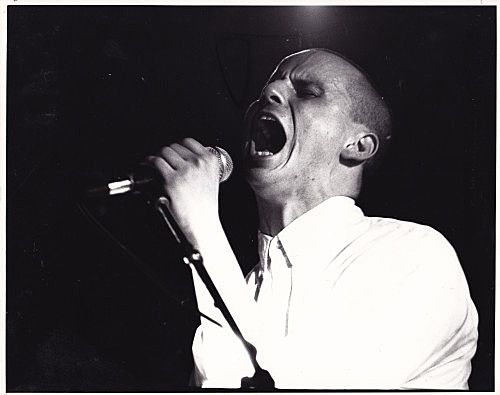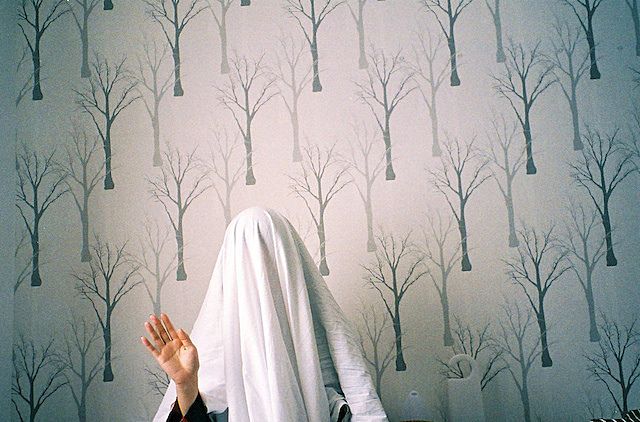Divine Muscles Flex: An Oral History of Skeptics
With Simon Ogston’s documentary Sheen of Gold premiering at the Auckland round of the New Zealand Film Festival on Saturday 3rd of August, and album reissues imminent, the outstanding legacy of New Zealand's pioneering industrial band, Skeptics, is being re-examined. Ahead of the commemorations, Gavin Bertram extensively interviewed the surviving members to get their story. This isn't a substitute for seeing Sheen Of Gold, which should showcase the visual and sonic force of the group exceptionally well given a big screen and a good audio system; rather, it's an addendum of first anecdotes from Skeptics' Palmerston North beginnings to their untimely 1990 dissolution.
The mid-1970s: Meeting David
“When I shifted to Palmerston North David D’Ath and I were best friends from day one. The first day I was at intermediate and the second day I was sick. And he turned up at my house on the second day out of the blue to see where I was. He dropped his bicycle on the pavement, and later on my older brother asked him why he always dropped it there. David said ‘it’s to keep the section in balance’. He was an unusual character, and he had a great mind. He thought in very different ways to other people.” (Robin Gauld, Skeptics guitarist 1979-85)
The late 70: forming X-IT
“The way it all began really was that I gathered an obsession with guitar playing at the end of my fifth form high school year, and over the summer I picked up an electric guitar and learnt a couple of chords. Then I basically bullied friends into becoming part of the band. David was my oldest friend probably, although we’d been in different classes at high school. In the sixth form we were in classes again and I said to him ‘I want to form a band and you should be in it’. So we formed an interest group and that was how we got X-IT going. I bullied Don White into playing the drums. He’d never played drums in his life, David had never sung in his life, and we had another guy, Ian Reiddy, who played the bass.” (Robin Gauld)
1979: the first Skeptics performance
“We played one gig at a (Freyberg High School talent) quest under the name of X-IT. The next time we played was in the school library, and there are some photos of that. That was midway through the sixth form. Within three or four months we had five or six songs for a concert in the school library. I have a tape of the school library show. It’s pretty interesting – the guitars weren’t in tune and we didn’t know the bass and the guitars together. We had absolutely no training.” (Robin Gauld)
“It was the usual band story of learning and experimenting,” (Don White, Skeptics drummer 1979-1990)
“It was a joke really. I probably knew the most musically – three chords maybe – and we learnt together. We got together and learnt our instruments and how to play together at the same time. We were pretty much on an even par, and learnt at the same level. I can imagine those early times would have been fairly punishing for anybody listening. (Nick Roughan, Skeptics bassist 1979-1990)
1979-81: Early songs
“Robin wrote the early stuff, and it’s pretty shocking. Fairly early on we realised that - and no slight on Robin - that his songs were pretty naff. We started writing music together and then David started writing lyrics and that was kind of the end of the Robin era of ‘here is a song and this is how it goes’. Fairly early on it turned into a collaborative thing.” (Nick Roughan)
“I was very much the driving force early on, and pretty dominant. Then I think we started to jam more, especially when Nick joined the band after about nine or ten months. The songwriting evolved into a collaborative effort, so most of the music that made its way onto the recordings came out of that.” (Robin Gauld)
1982: Auckland Battle of the Bands
“We drove up and it was quite the pilgrimage, with guitars and drums in one car, and things on the roof. We reached the final on Sunday and came second after The Gurlz. People said it was because the judges thought they were better looking. It was quite stunning coming second and beating all these other commercial acts. Things were starting to gel around that point, and that was around the time that ‘Last Orders’ went on the Furtive compilation record (Three Piece Pack), because the head of that label, Paul Rose, was there. That was a huge breakthrough.” (Robin Gauld)
1982: First recording – "Last Orders"
“To be honest, it wasn’t very different to just rehearsing. There was a bit of excitement that we were going to make a recording but back then we were trying our best to play the best that we could. So there was a lot of concentration required. I guess there was basically excitement at being able to make a recording and hearing it back.” (Nick Roughan)
“Ralph Bennett, the engineer, is an extraordinary guy really because he saw things completely outside of the box. He was a bluesman, and he totally got what we did and who we were. He was older than us, and he had a Tascam four-track and he said he’d come and record us. It was really a coming together of some extraordinary people and events that led to that recording being made.” (Robin Gauld)
“The early recording was away from outside influences so we just did our thing, with a little help from people with equipment and knowledge. Again there was a lot of experimenting.” (Don White)
“I think "Last Orders" is an absolute classic pop song. If we were a band now and had a push, it would be interesting to see how it would go.” (Robin Gauld)
1982: Furtive Four Tour
“It was an absolute blast. There were four bands, with like 25 people including road crew. We went from Auckland to Dunedin in almost one day non-stop. We made Oamaru on the first day, including catching the ferry. And then we played the Captain Cook for two nights, and then I think we played Oamaru, Christchurch, Wellington, Palmerston North, Hamilton I think, and Auckland.” (Robin Gauld)
“The van broke down in Oamaru and we had to fly some of our gear out. So we were in debt to Furtive and they had us up in Auckland to play like every night for a month to pay the debt.” (Nick Roughan, Stamp magazine 1990)
1983-4: Establishing the Snailclamps Club, Palmerston North
“(Us setting up our own venue) was probably driven out of despair, really - because Palmerston North was a desolate place for a young group who wanted to do things. We were given the opportunity to create the space in a city council arts centre. It sowed a really important seed, because there were a lot of young bands who practiced and came forward and played there.” (Robin Gauld)
“I must have been in my early 20s, and it was a kind of training ground. It gave us some idea on how to run events as well as being our rehearsal space. It was pretty cool really, like a training ground for running our own shows.” (Nick Roughan)
1983: More recording
“First there was ‘Last Orders’, then we recorded the Pyronnists Selection EP, only to find that the tapes got stolen from Propeller Records' Auckland office before release. They’ve since reappeared though. Some of the music’s okay. Then came the Industrial Tapes one (Skeptics Said), which was a compilation really - a bit of live and a bit of recorded stuff.” (Robin Gauld)
Recording Chowder Over Wisconsin (1983) and Ponds (ULP, 1985)
“Going into our second and third year things were evolving and we were starting to create our own sound on the Chowder Over Wisconsin record. And then onto the Ponds record, where we were quite influenced by The Birthday Party. There was a range of things going on, and we were starting to create our own unique sound. What progressed and shifted was the nature of the songs. We went through a lot of different influences in terms of what we were listening to and what we sounded like.” (Robin Gauld)
1985: Moving to Wellington
“We had to get out of where we were. It may have changed, but Palmerston North is no great place to live. It’s a pretty flat, dull place. Moving to Wellington, there were a lot more people doing stuff, a lot more resources. The whole thing just opened up for us. We ran into the Gordons guys, and great and long lasting personal as well as musical friendships started there. A big change and a well-needed one.” (Nick Roughan)
1985-86: Sampling enters the sound of Skeptics
“Moving to Wellington coincided with our experimenting with electronics. So the writing style and process changed and it became a more combined approach. It wasn’t difficult to integrate sampling, it was just a different approach, and it required a more precise and disciplined approach, especially when playing live. But it was a fun and exciting time, and for me the best time.” (Don White)
“It probably started around '85 or 86, when we heard about samplers and stuff. I was working in a music store at the time so I was kind of aware of what was going on. I had a play around on some and we thought this was definitely somewhere we were going to go. As far as integrating it into our thing it wasn’t a problem at all. When we moved to Wellington, Robin was planning to go to university overseas. So we were looking for a way of trying to augment our three-piece status. I was experimenting with drum machines and sequencers and rudimentary analogue keyboards and stuff.” (Nick Roughan)
“There was a wee bit of (sampling) on the Ponds record. By that stage the rest of them were living in Wellington and I was still in Palmerston North. I was quite resistant to it because I thought we were a guitar band and that’s what we should be. I thought we could make as much sound as we needed to with guitars. We were probably completely outside the box when it came to guitar music, and it doesn’t come through in our recordings at all well. But the live concerts, there was really nothing like it in terms of a guitar band in this country. The concerts were pretty ferocious. My resistance to the electronic sampler thing... I felt it would cheapen the music or something. Now I have a completely different view.” (Robin Gauld)
1986: John Halvorsen joins the group
“Actually, I hadn’t really heard much of the old Skeptics. I just met the guys when they were playing around with new technology and making samples and whatever. I had a common space with them. Brent (McLachlan, of Bailter Space) and myself started a space together that we built out of a practice room we shared with the Skeptics. My gear was in the same room and it was inevitable that we’d end up jamming together. That’s pretty much how it started. (John Halvorsen, Skeptics guitarist 1986, also a member of the Gordons and Bailter Space)
1986-87: Building the Hive: Writhe Studio
“We probably felt like we had a bit more control and a bit more room for creativity recording ourselves. It’s not always easy to get your ideas across to somebody in a studio in super-quick time. Especially if you’re not sure what you’re doing. It was partly necessity, and partly because we wanted to. And we were interested in the recording medium as a creative tool as much as any instrument.” (Nick Roughan)
“We were mad about recording. I know that Brent and I were, and the Skeptics were as well. Brent was a very good engineer already, and so was Nick. Both of them had just spent a few hours here and there working at a local studio, and got some skills there.” (John Halvorsen)
1987: Recording Skeptics III
“We’d built Writhe, our second studio, by that time, and that was one of the first records we made in there. We went on to make a lot of records for ourselves and other people there. I remember discovering that trying to be an engineer and a musician at the same time was a bad idea. The whole way through it’s always a learning experience trying to make the best record you can, trying to get it together, trying to make sure the songs are as good as they can be and learning your craft as a musician and an engineer and a producer.” (Nick Roughan)
“Of the songs, probably "Agitator" deserves most mention as the longest and fullest symphony of suffering, going through some spectacular changes en route to its denouement. In this connection the excellent production comes to mind. The LP is evidently the product of lots of studio time.” (Bruce Russell's contemporary review of III for Alley Oop!)
August 1987: the "AFFCO" video
“This song was written purely about some guys who ‘pack meat’ and the video was made in that light - not wanting to cast any aspersions on the workers in the meat trade - but to document the ‘process’ of a sheep’s life in contemporary NZ. I guess we got carried away wrapping David D’Ath, the singer, in glad wrap and baby oil and food colouring - but it was the natural result of a collaborative effort by those present at the shoot in an upstairs room at my Freemans Bay flat.” (Producer Stu Page, from The Truth About the Skeptics’ AFFCO video)
“The first time I saw it I was nearly sick. It was probably blown out of proportion really. I’ve seen footage like that on TV before. It’s controversial, but to anyone who eats meat, hello, that’s where it comes from.” (Nick Roughan)
“The graphic scenes of animal slaughter are unnecessarily detailed and prolonged, and despite the fact that they may be everyday scenes at freezing works, this does not imply that visuals of this nature may be screened on television.” (Garry Ryan, producer of "Radio With Pictures", TVNZ, on refusing to screen 'AFFCO' in 1987)
1989-90: Recording the final album
“I see Amalgam not so much as different albums but different songs. Each song with the Skeptics seemed to be its own kind of epic thing. It could be a style for an album in itself. For me all the records are pretty even, although the live EP, that period I’m very fond of especially.” (John Halvorsen)
“We spent many an hour at Writhe. For Amalgam, Brent and I spent time just going over our combined drumming for songs, using the rough recordings to help arrange our individual parts.” (Don White)
“Even for those who harbour doubts about the whole idea of musical modernism, for whom strangeness seems more like a vice than a necessity, Amalgam is too great a pleasure to ignore. Its attractions are intrinsically timeless: rhythms that reach for the pit of the stomach, guitar and synth sounds that explain titles like "Pack Ice" and "Sheen of Gold" far more vividly than any words and, most importantly, structures that stimulate near-cravings for each new tone or chord.” (Matthew Hyland, contemporary review in RipItUp)
1987-90: The live experience
“They were a lot of fun. We just did Wellington and Auckland and that’s all we did. We'd made our typical young band mistakes of touring and losing lots of money. We had a fair bit of stuff to drag around with us. So we stuck to Wellington and Auckland and that worked with us and the shows were always really good. A lot of fun to play, and really exciting and a little bit dangerous.” (Nick Roughan)
“In David D’Ath, the lead singer, they had a lightning rod. He could put more soul and energy into one song than most bands muster all night, sometimes in their whole career. To see him perform ‘Divine Muscles Flex’ was to witness a man plugged into the national grid, into something universal.” (David Geary, from his heartfelt Skeptics tribute Divine Muscles Flex)
“The Skeptics continue to refine their role as aural sculptors and dour visionaries of a world beyond the terminal beach. It’s a live experience that challenges listeners with precise, sombre jabs of noise from machines, guitars and drums, locked against D’Ath’s cry of humanity - the voice as an extra instrument without time to articulate its predicament. The Skeptics are set apart by the transcendent intensity of their performance. It’s uplifting by way of the band’s sheer force of will. Punishing and cathartic in the extreme, the Skeptics' noise is demanding and confrontational.” (Paul McKessar, RipItUp, 1990)
1979-1990: Ambitions foiled
“In our first year as a band, we had plans to go to straight to the UK. If we’d done that things could have been quite different. But we kind of got stuck in Palmerston North” (Robin Gauld)
“Our priority at the moment is to get our records distributed overseas, and getting over there. I got a phone call from a radio station in LA the other day; they've play-listed two of our songs, which is encouraging.” (Nick Roughan, interviewed for Stamp magazine, 1987)
“We were always hoping that something would develop with the overseas licensing thing, but it never really did. They were trying to get Flying Nun going in Europe, but it seemed to us that the emphasis was on straight-ahead guitar music. Which of course we weren’t particularly interested in by that stage.” (Nick Roughan, 2006)
1990: David D’Ath’s death
“It was a hard thing to lose your closest friend when you’re getting towards your peak of creativity. Not only that - but a great personal friend, who you’ve grown up with. It certainly changes your life and changes your outlook on things. I’ve found it hard ever since to find someone to collaborate with that I have the same empathy with. So I guess that’s kind of why I turned my skills towards production, producing and engineering. It was pretty devastating, to his family and to the band, and to all of his friends. In some ways we knew it was coming, but in others you never expect it. You’re always being positive and holding out hope. When he was still quite a sick guy, but in remission, we did some of our best shows ever.” (Nick Roughan)
“We were family. We grew up during impressionable times in our lives. I am sure it affected us individually in slightly different ways. It is a hard lesson in life. It did change the way I look at life, which is still there in me.” (Don White)
“He was just a very unusual, committed person, and sort of hard-edged but quite gentle. If he’d still been around I think it would be interesting to see what the band was doing because I think they were on the precipice. In their very last year they had started to draw quite large crowds, and people who had never previously gone to a Skeptics gig.” (Robin Gauld)
“In a darkened club, on a small stage covered with spiderwebs made of heated, stretched polystyrene, a semi-naked figure, lit by a single red spotlight, was performing the praying mantis movements of Tai Chi to the soundtrack from Apocalypse Now. It was David D’Ath...He will be remembered.” (Chris Matthews' obituary for David D'Ath, RipItUp, 1990)
Reflecting on the Skeptics
“We wouldn’t compromise ourselves to be something that we weren’t. We decided which way we were going to do things, and how we were going to sound. To us it was just normal; being on the fringes was just how other people saw us.” (Nick Roughan)
“I think the band was probably years ahead of its time. Now it seems quite soft, but in its time it was pretty hard-edged and unusual music. Now it completely fits within a range of genres that are going on in slightly left of centre music.” (Robin Gauld)
2013: Sheen of Gold
“I never expected there to be a movie, but Simon came to me with the idea. I’d never met him before, but I thought ‘if someone is going to do it I want to be involved to make sure it’s accurate’. There’s only one chance to do these things.” (Nick Roughan)
“It’s all a bit strange to be honest. I don't know all the interest is about. At the time I knew we were doing something very different, but I never imagined it would have this longevity.” (Don White)
“I’m fairly confident in saying there hasn’t been a documentary about New Zealand music made quite like this before. I’m pretty happy with it. I think I chose the right band to make a documentary about. The body of music the band created lends itself well to a movie soundtrack; it’s so varied, and so rich.” (Sheen of Gold director Simon Ogston)
Sheen of Gold screens as part of the New Zealand International Film Festival:
Auckland, SkyCity Theatre, 6pm Aug 3
Wellington, Paramount, 6.30pm Aug 8
and The Film Archive, 8.15pm Aug 10
Christchurch, Northlands 3, 8.30pm Aug 12
Dunedin, Rialto, 8.30pm Aug 13, 4.15pm Aug 14
Flying Nun (in concert with NYC label Captured Tracks)
will be giving the two final Skeptics albums, III and Amalgam,
an international re-release this month.





